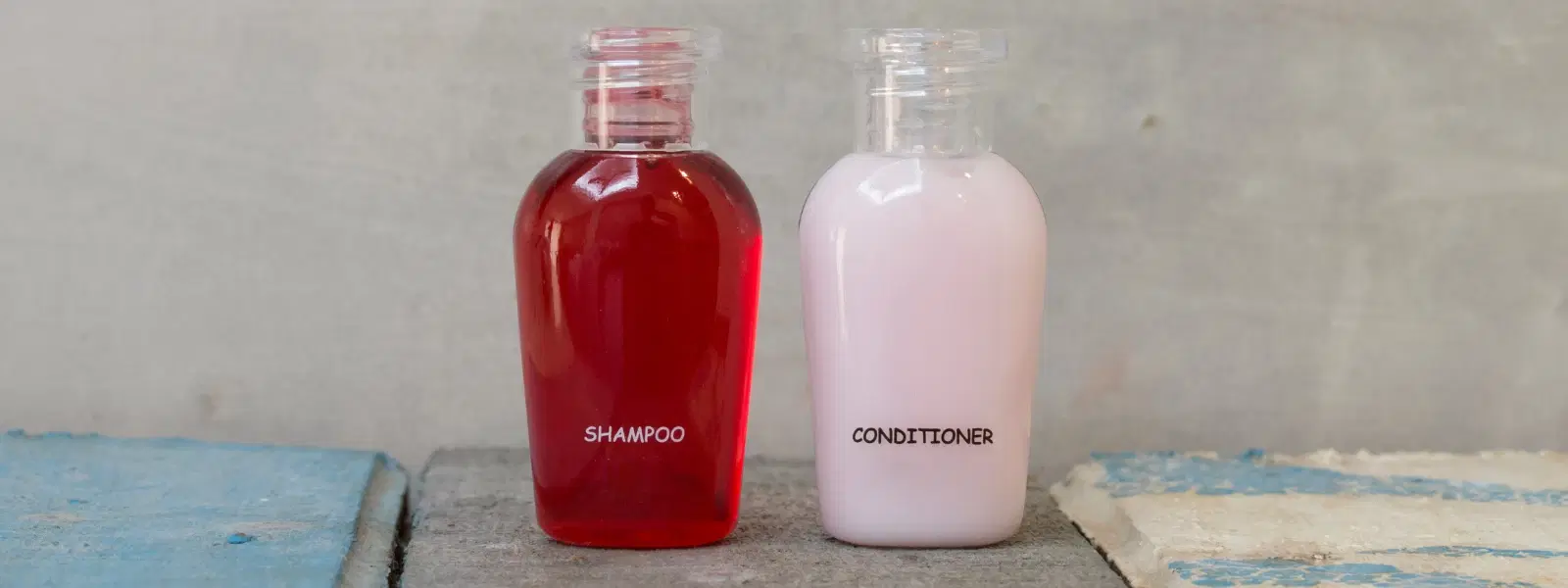
Beauty & Skincare
•04 min read
-9872eb55-9af0-4022-8644-bd8f05e8333e.png&w=3840&q=75)
Hair conditioners are a cornerstone of hair care routines. They help in achieving vibrant, manageable, and healthy hair. In this guide, we cover your burning questions about conditioners. You will learn about the benefits of different types of conditioners and how to best use them for your hair needs.
Hair conditioner is a nourishing product that boosts your hair's texture and overall health. It replenishes moisture lost during washing and smooths the hair cuticle to control frizz and tangles. Whether you use a hydrating conditioner, a moisturizing conditioner, or a conditioner for dry hair, its key role is to offer hydration and protection to your hair.
Conditioners work by coating the hair shaft with helpful ingredients like emollients, proteins, and natural oils. These components help repair damage, reduce breakage, and give your hair a healthy shine. In doing so, the product supports your self-expression through well-nourished hair that looks and feels vibrant, reflecting your unique style and personality.
Leave-in conditioners are lightweight formulations applied to damp hair and not rinsed off. They ease detangling, offer moisture, and create a protective barrier against environmental stress. Their simple application allows you to highlight your style while keeping your locks healthy.
Deep conditioning treatments are intensive care solutions that penetrate deeply into the hair. They are perfect for repairing damage, restoring hydration, and improving hair elasticity. Those with dry or chemically treated hair benefit immensely from these treatments as they offer a boost of care that transforms tired strands into a luscious mane.
Hydrating conditioners add water to your hair, while moisturizing conditioners lock that water in. These products are essential for hair prone to dryness, such as curly or coarse hair types. With regular use, these conditioners help maintain soft, touchable, and manageable hair, aligning with the idea of celebrating your individuality.
There are several specialty conditioners that cater to specific needs:
-5ba1f1f6-995b-4617-a1ff-43890351cff7.png&w=3840&q=75)
Natural Hair Conditioner: Uses plant-based ingredients free from synthetic chemicals, giving your hair a natural boost.
Sulfate-Free Conditioner: Gentle formulas ideal for sensitive scalps and color-treated hair, maintaining vibrancy without harsh chemicals.
Repairing Conditioner: Infused with proteins and keratin, it rebuilds and strengthens damaged hair.
Anti-Frizz Conditioner: Designed for humid climates, it smooths the hair cuticle, reducing flyaways and lending a polished look.
These options are crafted to ensure that every hair type finds a formula that supports its natural beauty and unique identity.
Using conditioner correctly is as important as choosing the right product. Start by selecting a conditioner that suits your needs such as a conditioner for dry hair or an anti-frizz conditioner. After shampooing, squeeze out excess water and apply the conditioner to the mid-lengths and ends, letting the formula work its magic. Follow the product instructions and leave it in for the advised time, then rinse thoroughly with lukewarm water. These simple steps help maximize the benefits without weighing your hair down.
A few pitfalls to watch out for include using too much product, which can lead to a heavy and limp feel, and applying the conditioner directly to the scalp, often resulting in a greasy look. It is equally important to rinse your hair properly to avoid residue buildup. Keeping these tips in mind ensures that your hair always retains its natural bounce and style.
If your hair tends to feel dry, a moisturizing or hydrating conditioner is your best friend. Such formulas are designed to replenish lost moisture and improve overall hair elasticity. With the right conditioner for dry hair, your strands remain soft and resilient, letting you express your style confidently.
For those dealing with frizz, anti-frizz conditioners are designed to tame unruly strands by smoothing the hair cuticle and reducing flyaways. This special formulation is perfect for managing the effects of humidity. When you choose an anti-frizz conditioner, you’re investing in hair that looks polished and feels effortlessly styled.
Repairing conditioners come fortified with keratin and proteins that help rebuild and strengthen damaged hair. Regular use assists in reducing breakage and restores the hair’s natural luster. These conditioners are ideal for reviving hair that has faced the challenges of styling, coloring, or environmental stress.

Sulfate-free conditioners shine for those with color-treated hair. Their gentle formulation protects your color and maintains vibrancy without stripping away natural oils. This means your hair remains healthy and bright, letting you wear your color as a bold statement of individuality.
Pro Tip: Maximize Your Conditioner’s Benefits
Did you know that applying conditioner to damp, towel-dried hair can improve absorption? Excess water can dilute the formula, so squeezing out extra moisture before applying conditioner ensures your hair gets the full benefit.
You can use conditioner every time you wash your hair. Deep conditioning treatments should be done once a week or as needed.
Yes, you can use conditioner alone, especially if you prefer a co-washing routine. However, shampooing occasionally is important to remove buildup.
Leave-in conditioners offer lightweight hydration and protection. Rinse-out conditioners provide deeper nourishment. The best choice depends on your hair's specific needs.
If you use too much or apply it to your scalp, your hair might become greasy. Focus on applying conditioner to the mid-lengths and ends for optimal results.
Hydrating conditioners add water to the hair while moisturizing conditioners lock in that moisture. Both types are beneficial, especially for dry hair types.
Conditioners are an essential part of any hair care routine, offering hydration, protection, and repair for various hair types and concerns. By understanding the distinct benefits of leave-in conditioner, deep conditioning treatment, and other specialty formulas, you are better equipped to achieve your desired hair health. With informed choices and proper application, your hair can truly reflect your style and individuality, remaining both beautiful and resilient. Explore more about hair care to discover the products that align with your unique needs.